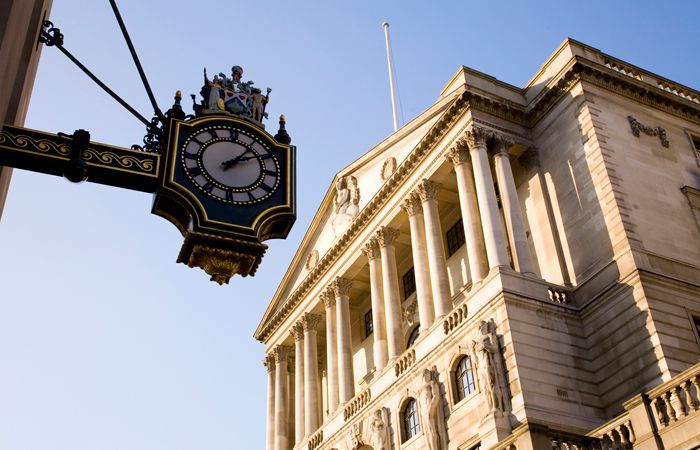
Earlier today the Bank of England (BoE) announced a base rate increase of 25 basis points to 1.25%, in a move described as a “missed an open goal”.
The increase marks the fifth base rate rise since December 2021 after a decade of historic lows.
Commenting on the rise, Shaw Financial Services founder Lewis Shaw says: “The Bank of England has missed an open goal to increase bank rate by 0.5% after the US Fed raised its rate by 0.75%, instead opting for another marginal rise of 0.25%. If the pound weakens against the dollar, we could see the cost of imports rise, further exacerbating inflationary pressures and heaping misery upon woe.”
“Assuming the Bank of England increases rates by 0.25% at each subsequent meeting this year, it would put the bank rate at 2.25% by Christmas. We’re quickly heading into dangerous territory with worries of wage-price spirals. The similarities with the 1970s are now painfully apparent.”
Meanwhile, Wildcat Law co-founder and chartered wealth manager David Robinson describes the move as “symbolism at work”.
Robinson says: “The fact that we had a 0.25% increase rather than a 0.5% hike is a sure sign that the Bank of England understands that this is all about appearing to have some level of control in an economic environment where they in fact have very little actual control.”
“In predicting the economy will shrink by 0.3% in the second quarter, they are highlighting why they simply cannot afford to raise rates any faster. To do so will run the very real risk of stagflation. The figure everyone on both sides of the Atlantic will be looking at very nervously at the moment is the unemployment rate. If that starts to tick up, things could deteriorate quickly,” he adds.
The MPC minutes say the committee expects inflation to be over 9% during the next few months and to rise to slightly above 11% in October. The increase in October reflects higher projected household energy prices following a prospective additional large increase in the Ofgem price cap.
Yorkshire Building Society strategic economist Nitesh Patel says: “The trajectory has clearly been set as the Bank of England look to bring inflation under control. However, there is a fine balance between achieving this and making sure that the economy, and importantly jobs, are protected as far as possible given that a number of factors, such as rising food and fuel prices, will not be dampened by this latest increase.”
Also commenting, Coreco managing director Andrew Montlake says: “Though widely expected, this latest rise will be another hammer blow to borrowers and it will no doubt lead to yet another spate of mortgage lenders quickly pulling their current product offerings and re-pricing them upwards.”
“For those who are looking at remortgaging now, there will be a sizeable payment shock as they come off lower fixed rates into a market priced around 1% higher than they are currently paying. All of this exacerbates the cost-of-living crisis that is already throttling household finances, as higher mortgage payments join rising energy, food and fuel costs.”
“It is also starting to feed through into lenders’ affordability calculations, meaning people are seeing their borrowing power diminish. At some stage, the rate rises we’re seeing will start to affect the housing market and we expect the pace of growth to fall back over the coming months. That said, demand is still high and successive Governments’ failures to make a dent in the supply of good quality, affordable housing will support prices.”
In May, MPC member Michael Saunders said that, in his opinion, inflation may exceed the 10% peak forecast for Q4 2022 in the latest monetary policy report (MPR).
Saunders explained that the MPR forecast assumes several economic factors, including weakness in spending, cuts in employee hiring – with unemployment rising – and supply chain problems easing.
MT Finance director Tomer Aboody says the rate rise “was fully anticipated by the markets due to the need to manage soaring inflation”.
He explains: “It will help cap some excess spending by consumers, although many have been cutting back where they can for a while in the face of rising bills and the wider cost of living. ”
“Mortgage pricing continues to edge upwards, but many lenders have not passed on the full extent of previous rate rises due to the highly competitive market. If they want to attract business, they need to absorb a proportion of rate increases; the question is, how long will they be prepared to do this for?”
Discussing how today’s interest rate hikes affect first-time buyers, Proportunity chief executive and co-founder Vadim Toader says it’s “disappointing news”.
“With this announcement following in quick succession to the previous hike in May, those who have been trying to get on the property ladder now face yet another financial setback, as mortgages will be pushed even further out of their borrowing reach.”
“As a result of these rising rates, and with the deadline for Help to Buy looming, first time buyers may need to explore other lending options that can help them to increase their deposit and access better rates by lowering their loan to value,” Toader adds.



